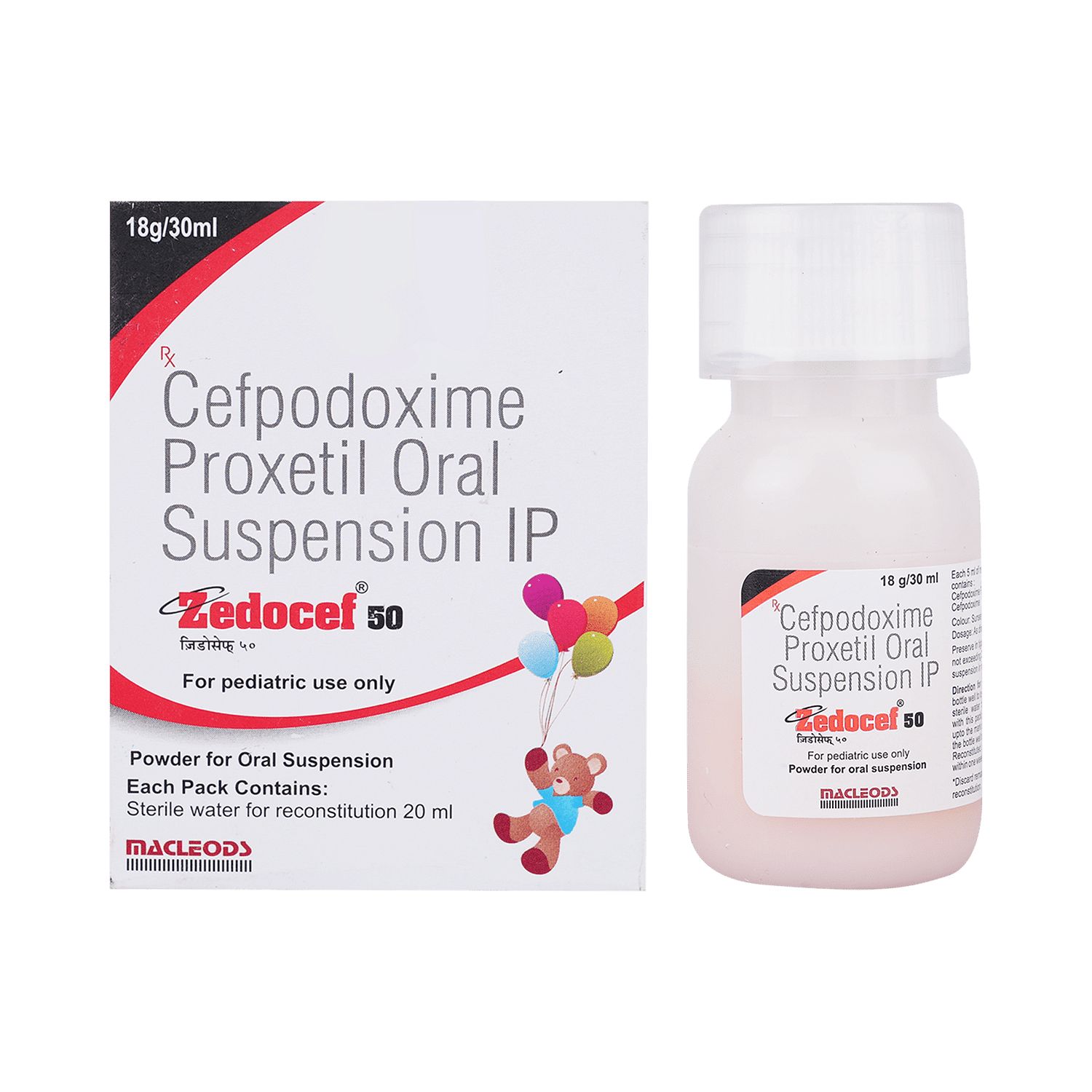
Cliver Syrup
Manufacturer
Adley Formulations
Salt Composition
Cefpodoxime Proxetil (50mg)
Key Information
Short Description
Cliver Syrup is an antibiotic medicine used to treat a wide range of bacterial infections in children, including ear, eye, nose, throat, lung, skin, gastrointestinal tract, and urinary tract infections, as well as typhoid fever.
Dosage Form
Syrup
Introduction
Cliver Syrup is an antibiotic medicine commonly given to children for the treatment of a wide range of bacterial infections. It is effective in treating infections targeting the ears, eyes, nose, throat, lungs, skin, gastrointestinal tract, and urinary tract. It is also used to treat typhoid fever in children and adolescents.
Directions for Use
Give this medicine with food to avoid an upset stomach. Encourage your child to drink plenty of water in case diarrhea develops as a side effect.
How it works
Cliver Syrup is an antibiotic that works by preventing the formation of the bacterial protective covering (cell wall) which is essential for the survival of the bacteria. By doing so, this medicine stops the infection-causing bacteria from growing further and prevents the infection from spreading without making the bacteria resistant to further treatment.
Quick Tips
Your child must complete the entire course of antibiotics. Stopping too soon may cause the bacteria to multiply again or become resistant or cause another infection. Give this medicine with food to avoid an upset stomach. Encourage your child to drink plenty of water in case diarrhea develops as a side effect. Conditions like common cold and flu are caused by viruses. Never use this medicine for such conditions. Only give Cliver Syrup to your child for their current infection. Never save medicine for future illnesses.
Related Medicines

Pod 50mg Syrup

Fawnpod 50mg Syrup

Toppod Syrup

Zedocef 50mg Syrup

Torpod 50mg Syrup

Xofex 50mg Syrup

Cacef 50mg Syrup

Cefdum 50mg Syrup

Plugdox 50mg Syrup

Pazopod 50mg Syrup
Frequently asked questions
What if I give too much of Cliver Syrup by mistake?
Taking more than the prescribed dose of Cliver Syrup is unlikely to cause harm. However, if you think you or your child have taken an excessive amount, consult a doctor immediately. Overdose may lead to unwanted side effects and even worsen your child's condition.
Are there any possible serious side effects of Cliver Syrup?
Serious side effects of this medicine include persistent vomiting, kidney damage, allergy, diarrhea, and severe gastrointestinal infections. Consult a doctor if you experience any of these issues while taking Cliver Syrup.
Can other medicines be given at the same time as Cliver Syrup?
Cliver Syrup can sometimes interact with other medications or substances. Always inform your child's doctor about all medications your child is taking before starting Cliver Syrup. It is also recommended to consult with a healthcare professional before administering any medication to your child.
Can I get my child vaccinated while on treatment with Cliver Syrup?
Antibiotics generally do not interfere with the ingredients in vaccines or cause a negative reaction in a child who has recently been vaccinated. However, children taking antibiotics should avoid getting vaccinated until they recover from the illness. After your child feels better, the vaccine can be administered.
Which lab tests may my child undergo while taking Cliver Syrup on a long-term basis?
Your doctor may recommend periodic kidney function and liver function tests to monitor your child's condition during long-term use of Cliver Syrup.
The mucus coming out of my child’s nose is yellow-green. Is it a sign of a bacterial infection?
Yellow or green mucus in the nose does not automatically indicate a bacterial infection. During a common cold, mucus can thicken and change color from clear to yellow or green. These symptoms usually last for 7-10 days.
My child is having a sore throat and ear infection. Can I give antibiotics?
No. More than 80% of sore throats and ear infections are caused by viruses, and antibiotics are not given for viral infections. If your child has a sore throat, runny nose, a barking cough, pain, and discharge from the ear, it is most likely due to a virus. Consult a doctor.
Does a common cold caused by viruses always result in a secondary bacterial infection? When to start an antibiotic to prevent infection?
In most cases, bacterial infections do not follow viral infections. Using antibiotics to treat viral infections may lead to side effects without benefiting your child's health. Use antibiotics only after consulting with a doctor.
Can Cliver Syrup impact my child’s digestive system?
Children often experience a sensitive stomach and develop nausea while taking antibiotics. The good bacteria in their gastrointestinal tract may also be negatively affected. Cliver Syrup might kill off the good bacteria, potentially increasing the risk of developing other infections. If your child experiences diarrhea while on Cliver Syrup, do not stop the medication course; instead, contact your doctor for guidance. In some cases, a dosage adjustment may be required.
Can Cliver Syrup lead to bacterial resistance in my child?
Yes, irregular treatment, repeated use, and misuse of Cliver Syrup can contribute to resistance. Resistant bacteria are no longer killed by the antibiotics and might lead to reinfection.


